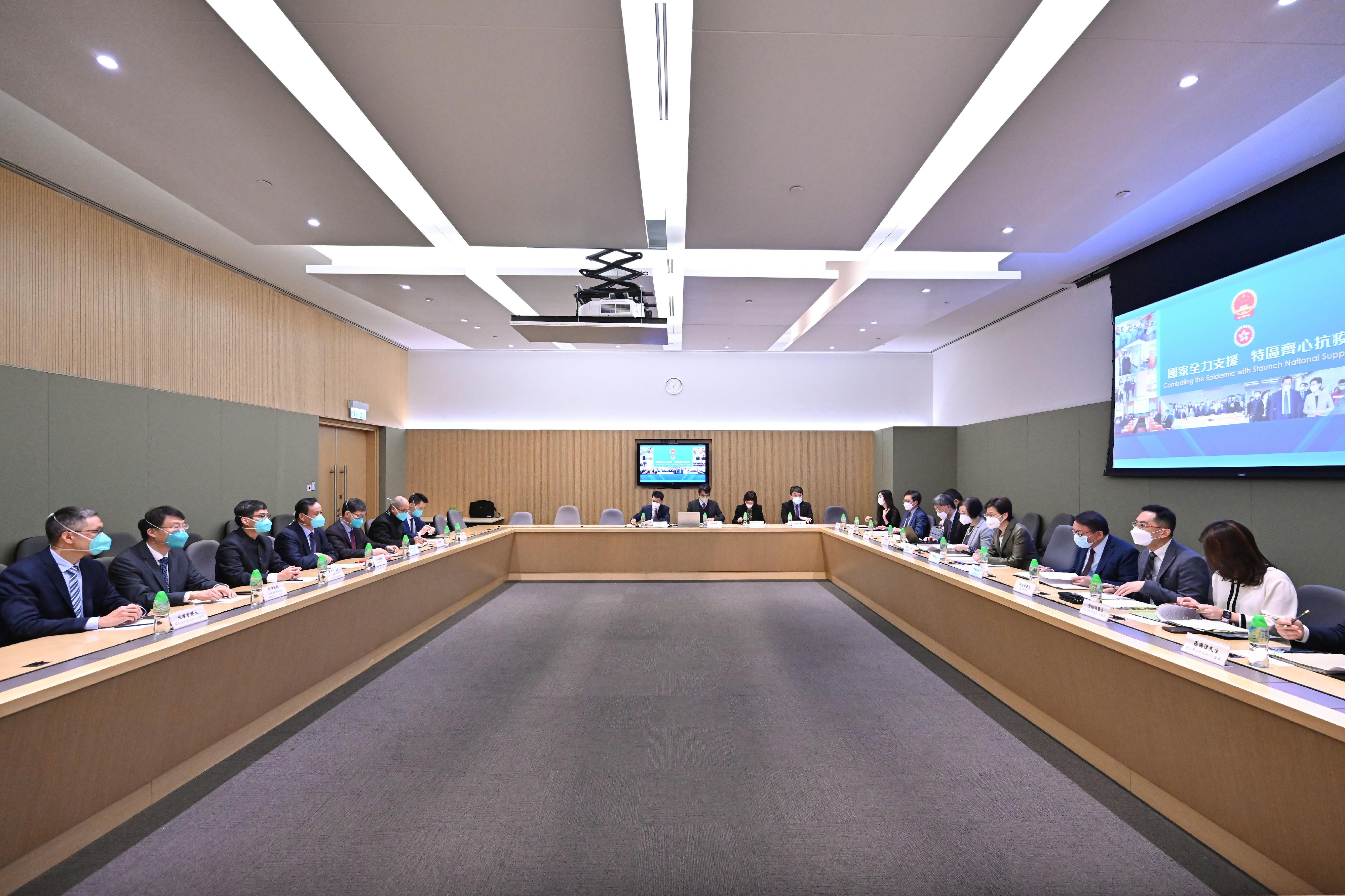CE meets with members of Mainland Chinese medicine expert group of Central Authorities (with photo)
​The Chief Executive, Mrs Carrie Lam, met with members of the Mainland Chinese medicine expert group of the Central Authorities (expert group) today (April 7) to listen to their views on the use of Chinese medicine against the COVID-19 epidemic, as well as on the further development of Chinese medicine in the Hong Kong Special Administrative Region (HKSAR), following their arrival in Hong Kong last week to look into and support the HKSAR's anti-epidemic work. The Secretary for Food and Health, Professor Sophia Chan, the Director of Health, Dr Ronald Lam, and the Chief Executive of the Hospital Authority (HA), Dr Tony Ko, also joined the meeting.
Mrs Lam expressed her sincere gratitude to the Central Authorities for staunchly supporting Hong Kong's anti-epidemic efforts, including sending in an expert group led by Mr Tong Xiaolin, academician of the Chinese Academy of Sciences, last Tuesday (March 29). Over a week or so in Hong Kong, not only had the expert group met with various members of the HKSAR's anti-epidemic team, including the relevant bureaux and departments of the HKSAR Government, the HA, the Chinese Medicine Development Committee, the Chinese Medicine Council of Hong Kong and the Chinese medicine sector, it had also conducted field visits to various facilities, including hospitals, a community isolation facility, a holding centre for the elderly, residential care homes for the elderly, as well as a Chinese medicine centre of a tertiary institution, in order to further their understanding of the use of Chinese medicine at various levels of prevention and treatment of COVID-19 in Hong Kong. They had also shared with the above members their rich, invaluable experience of fighting the epidemic with the use of Chinese medicine.
The HKSAR Government of the current term attaches great importance to the development of Chinese medicine. With Chinese medicine incorporated into Hong Kong's public healthcare system pursuant to the 2018 Policy Address, the Government is taking forward at full steam the construction of Hong Kong's first Chinese medicine hospital, which is expected to come into service in phases from 2025 onwards. In the fight against the epidemic, the HKSAR Government has been actively promoting a wider application of Chinese medicine. Such efforts include supporting the HA to provide Chinese medicine treatment service for COVID-19 in-patients and those in recovery, as well as to offer treatment with Chinese and Western medicines integrated at the Treatment Centre for COVID-19 at AsiaWorld-Expo in collaboration with the Mainland medical support team; supporting the Chinese medicine sector to provide telemedicine service; supporting Chinese and Western medical teams to jointly make ward rounds and formulate treatment plans at the holding centres for the elderly; and providing proprietary Chinese medicine in the anti-epidemic kits for people under isolation or quarantine, and early this month, in the anti-epidemic service bags to all households in the territory, as well as through district distributions by voluntary organisations, for use by members of the public based on health conditions.
In addition, Mrs Lam expressed her gratitude to the expert group for formulating four plans for the Chinese medicine sector of Hong Kong, covering the use of proprietary Chinese medicine at home, Chinese medicine diagnosis, Chinese medicine rehabilitation, and Chinese medicine prevention and treatment. The details would be publicised through various channels, including the HKSAR Government's COVID-19 thematic website (www.coronavirus.gov.hk), social media platforms and the Chinese medicine sector. On the basis of its current anti-epidemic measures and the expert group's advice, the HKSAR Government would continue to promote the popularisation and use of Chinese medicine in Hong Kong along the "three easy" principles put forward by the expert group, viz. "easy to understand", "easy to do" and "easy to get".
Mrs Lam said, "Chinese medicine has been given full play in the whole process of epidemic prevention, treatment and rehabilitation amid the fight against the fifth wave of the epidemic, contributing to the gradual subsiding of the local epidemic situation. I am pleased to note that more members of the public have benefitted from the efficacy of Chinese medicine, and that the community at large has become more attuned to the anti-epidemic work involving Chinese medicine and more confident in using Chinese medicine. I hope that the HKSAR Government, jointly with the HA and the Chinese medicine sector, will seize the opportunity to chart a promising path for the development of Chinese medicine in Hong Kong."
